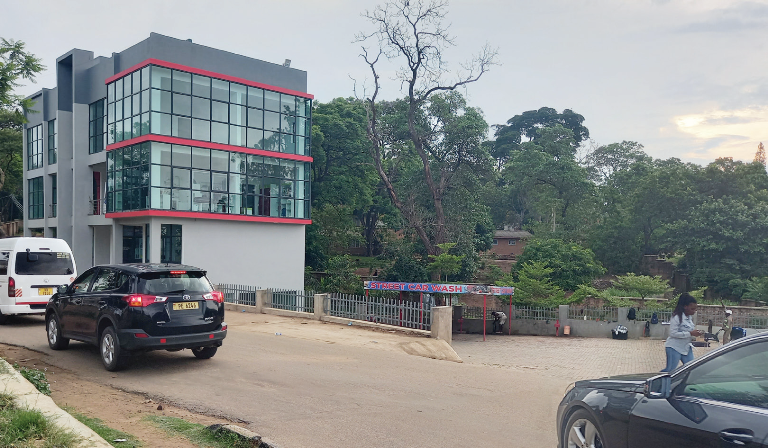Illegal and substandard structures are sprouting unhindered in undesignated and prohibited spaces in Malawi’s cities, disrupting urban master plans in the process.
And interviews with officials from three of the four major cities of Blantyre, Lilongwe and Mzuzu show that the local authorities are helpless as some cunning developers obtain stay of execution orders when cities want to act against them.
A developer is constructing behind these structures at Kristwick in Blantyre
Blantyre City Council director of town planning Costly Chanza said in a written response to a questionnaire that while the council, through Blantyre Physical Planning Committee, is mandated to control developments in the city’s formal areas, it has struggled to deal with errant developers.
He said: “However, isolated cases do pop up when developers violate regulations by implementing development projects with no regard to development control, zoning or building regulations.
“A majority of the commercial buildings were approved and developed in the designated
spaces for commercial (purposes). However, there are some structures, which were constructed in areas not zoned for commercial development.”
Cities are supposed to be developed as per zoning
Chanza said developers in some cases submit insufficient information to the Council’s Physical Planning Committee.
Urban land is demarcated into different land uses such as residential, institutional and commercial. This process ofdemarcation is referred to as zoning.
Chanza said: “In the recent past, it has been observed that residential areas, especially those near the CBD [Central Business District] are being ‘encroached’ upon by other land uses, especially commercial activities.
Chafunya: The council
served stop orders
“The Blantyre Urban Structure Plan madea recommendation of the matter to convert this spillage zone into commercial zone as one way ofexpanding the CBD area. There are acceptable and unacceptable uses in as far as change of use is concerned.”
He said acceptable uses include offices, services such as hairdressing, shoe repairs, clothing manufacturing and trading.
On the other hand, the unacceptable uses include car repair, haulage contracting, animal breeding, forging, joinery, storage and processing of dangerous materials such as cellulose spraying, upholstery, manufacturing of paper and straw goods.
The Physical Planning Act 2016, he said, requires that before land is converted from one gazette use to another, permission should be obtained for its conversion.
Chanza said the council carries out demolition exercises on illegal structures, but there are some matters that are still in court.
On buildings under construction in the city where contractors use women to carry concrete upstairs instead of excavators, he also said this isnot acceptable.
“This is against by-laws and building regulations on construction safety requirements. Contractors are supposed to use certified and acceptable building machinery,” Chanza said.
Lilongwe City Council spokesperson Tamara Chafunya said most small to medium commercial developments in residential areas are not conforming to set standards.
She said: “In most cases, the council has served stop orders and in extreme cases has demolished some of such developments. Currently, the council is working on guidelines on incompatible uses in residential areas to regulate types of developments.”
Mzu z u C i t y C o u n c i l spokesperson McDonald Gondwe said they were aware of developers that do not seek the council’s approval before commencing their developments.
He said: “This comes at a time when there are mushrooming of infrastructure projects. Usually when we observe such anomalies, we report to the Physical Planning Committee which makes a determination of whether to demolish or otherwise.
“This usually happens after the council has already served Stop Notice and warnings of the same. So in this case, when the council notes that someone is developing illegally, we immediately stop them from progressing with their projects.”
The National Construction Industry Council of Malawi (NCIC), empowered by an Act of Parliament to regulate, develop and promote the construction industry in the country, said not all structures being constructed in the four cities meet standards and quality expectations.
For example, NCIC has issued stop orders to four structures for their failure to comply with regulations, according to chief executive officer Gerald Khonje.
On the other hand, Malawi Institute of Architects said some constructions in the cities are not meeting set standards because project owners are using unregistered architects, engineers and quantity surveyors, building on land allocated outside zoning requirements and physical planning regulations, among others.
Khonje said some projects have been suspended and others have been issued with compliance
orders.
“As NCIC, we monitor compliance with regulations and requirements in line with our mandate to ensure players in the industry are operating ethically and professionally.
“Where there are non-compliance or unethical issues, the NCIC issues the appropriate regulatory, compliances and corrective orders in line with relevant regulations,” he said.
The CEO disclosed that projects that NCIC-issued stop orders include Mall of Africa structure housing ChipikuPlus along Masauko Chipembere Highway, Shire Valley Transformation Project’s construction of canal and construction of laboratory complex at Malawi University of Science and Technology.
Khonje said they have developed Infrastructure Delivery Management Standards (IDMS), to guide the conception, design and implementation of infrastructure projects across the country.
The IDMS, in its draft form, would be utilised by all agencies and organisations involved in planning and implementation of construction projects.
Khonje also said NCIC has established Infrastructure Technical Audits which would enable it to detect deviation from standards and the remedial measures to be instituted to achieve quality infrastructure.
“It should be noted that the quality of a structure depends on many factors some of which are designs, resources and the workmanship involved. As a council, we monitor the performance and conduct of our players and where we find them wanting, we suspend/stop the works until when remedial actions are undertaken,” he said.
Khonje said lack of collaboration among various entities and agencies has been identified as one of the shortfalls that have caused uncoordinated development and illegal development.
Malawi Institute of Architects (MIA), which is empowered by laws to promote the cause, maintain the standards, and foster the understanding, the study, and the practice of architecture, said some constructions are not meeting the required standards.
MIA president Catherine Sani said: “For all commercial developments to be constructed to acceptable standards, it would mean that the entire process is regulated.
“Un f o rtunately many problems start with commercial development owners who want to bypass the use of professionals and use unregistered persons to save costs, and seek the services of an architect simply to endorse designs, a practice we do not promote.”
She said MIA plays a role in supporting the regulatory body, the board of Architects and Quantity Surveyors, in ensuring that only those that are qualified, are registered as architects and are capable of implementing the acceptable and approved standards in the construction of buildings.
The post Cities helpless amid lawlessness in construction appeared first on The Nation Online.
 Moni Malawi
Moni Malawi 

